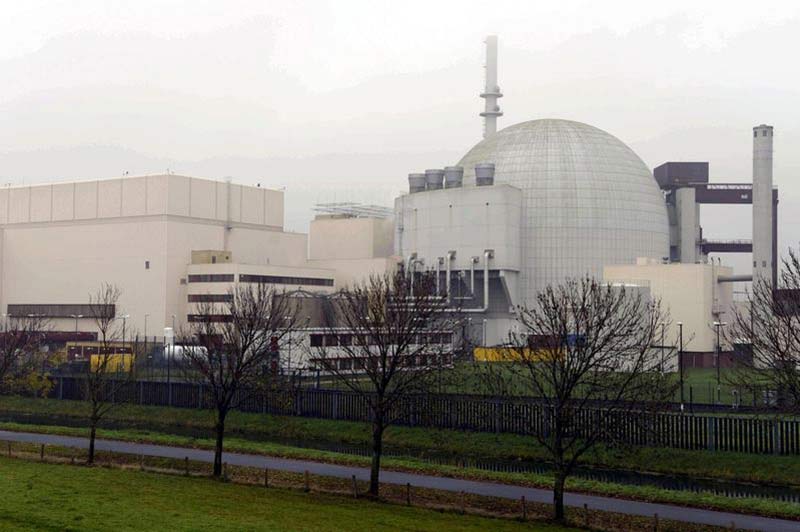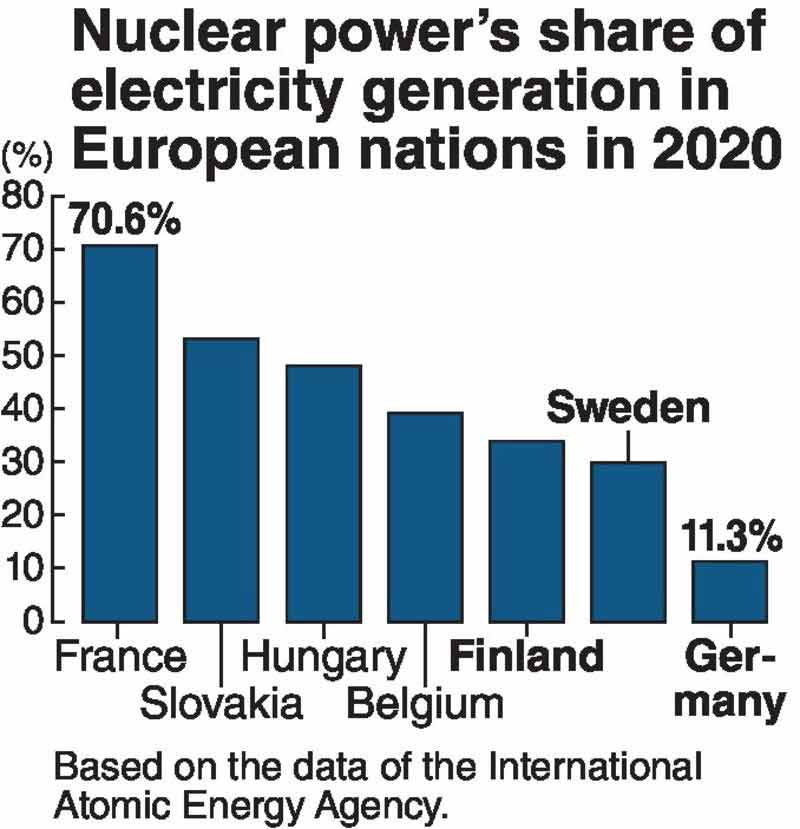
The Brokdorf nuclear power plant is seen in northern Germany on Nov. 11. It will cease operating by the end of this year.
November 22, 2021
In the north German village of Brokdorf, near the mouth of the Elbe River that flows to the North Sea, is a nuclear power plant. The facility, which features a building with a dome-shaped roof, will cease operations by the end of this year, and work to decommission its reactor will get into full swing.
The plant started operating in 1986 and has provided a stable supply of electricity to the surrounding region. However, in the wake of the accident at Japan’s Fukushima No. 1 nuclear power plant in March 2011, the administration of German Chancellor Angela Merkel announced later that year a plan to phase out nuclear power. The German government decided to shut down the nation’s 17 nuclear reactors by the end of 2022. The Brokdorf reactor is one of six reactors still operating in Germany.
Brokdorf Mayor Elke Gottsche has mixed feelings about the reactor being taken off the grid. “We also were shocked by the Fukushima nuclear accident,” said Gottsche, 70. “The federal government’s plan was welcomed, but around here, there also was pushback from workers at the nuclear plant and companies engaged in the nuclear industry.”
The nuclear plant has been a source of jobs for many residents in the village of about 1,000, including workers for maintenance companies and other businesses operating in the surrounding region.
Germany’s energy situation has changed rapidly since the government announced the end of domestic nuclear power generation. In 2010, nuclear power accounted for 22% of all electricity generated in Germany. In 2020, this figure had halved to 11%. Renewable energy sources, which accounted for just 17% of electricity production in 2010, had climbed to 45% in 2020 and eclipsed electricity generated by coal and other fossil fuels, at 44%, for the first time.
These changes also have had an impact on people’s daily lives. Demand for natural gas, which produces relatively low volumes of carbon dioxide when combusted, has increased in Europe. This has pushed up the costs incurred by electricity-generating companies in Germany, which has resulted in higher power and gas bills for consumers.
According to a public opinion survey conducted in September by a German price information service company, 77% of respondents said they wanted the federal government to take steps to hold prices down. As many as 31% of respondents also said they wanted nuclear power plants to continue operating to help keep power prices stable. This figure was an increase of 11 percentage points from a similar survey conducted in 2018. It revealed now many people are changing their views on accepting the move away from nuclear power.
“Germany’s energy supply is in a critical situation,” said a 61-year-old Brokdorf man who has worked as a security guard at the plant for 35 years. “We need this plant not only to provide employment for people in this area, but also to ensure a stable electricity supply that doesn’t rely on imported natural gas.”
Germany’s neighbor, France, is taking a starkly different approach — it is preparing to build new nuclear power plants.
During a televised speech on Nov. 9, French President Emmanuel Macron announced France would restart the construction of new nuclear reactors “for the first time in decades.” The aim is to reduce France’s dependence on other nations for its energy supplies and strengthen its autonomy. Macron also said greater investment must be made in the production of carbon-free energy, as part of the steps for tackling climate change.
France is a major user of nuclear power — nuclear plants generate about 70% of all electricity produced in that nation. After the Fukushima nuclear accident, the French government announced a plan to reduce the nuclear share of its power mix from about 70% to about 50% by 2025. The current government has basically followed this plan, although it has pushed back the target date to 2035.

Macron, who has his eye on reelection next April, has become a proponent of nuclear power. It seems he is keenly aware that rising power bills have stoked public discontent with the government, and that about 200,000 people are employed in the nuclear power industry.
Left-wing political parties and environmental organizations slam nuclear plants as being expensive, outdated and dangerous. Despite this, Britain also announced in October that it is aiming to decide on a plan to build at least one large nuclear plant by 2024. Finland is pushing ahead with preparations to commence operation of a new nuclear plant. Positive views on the value of nuclear plants are quietly starting to spread.
Turning to next-gen reactors
Last winter, widespread blackouts threatened to become a very real possibility in Japan. In the Kansai region, a power supply crunch resulted in the electricity system’s usage rate — the proportion of demand against supply — hitting 99% at one point. The power supply-demand balance remained precarious for some time.
Demand for electricity climbed from mid-December as a cold snap lashed the nation. This coincided with equipment failures and other problems that caused seven coal-fired power plants to suddenly halt operations, which was an unexpected situation. Power utilities turned to the alternative of liquefied natural gas to produce electricity. As a result, LNG stocks ran low. Almost all LNG used in Japan is imported from overseas, and the nation’s inventories will last only for about two weeks due to the nature of the gas, which turns to vapor.
Delays in restarting Japan’s nuclear reactors also put a squeeze on the nation’s electricity supply.
A new strategic energy plan approved by the Cabinet in October spelled out a government plan to put “top priority” on renewable energy, while emphasizing that a stable supply of electricity must not be “impaired.” Prime Minister Fumio Kishida has stated Japan cannot meet its electricity needs by relying solely on renewables, and that “nuclear power also must be considered” at a time when the nation requires multiple options.
In the United States, a startup established by Microsoft Corp. founder Bill Gates revealed a plan this month to start operating its first next-generation nuclear reactor in western Wyoming in the latter half of the 2020s.
This reactor uses natrium — or sodium — and not water, as a coolant. This has the benefit of producing less harmful waste products than conventional reactors, and also of producing less waste. Gates’ firm is partnering with a joint venture established by U.S. company General Electric Co. and Hitachi, Ltd. on technical cooperation for the reactor, and a power company under the umbrella of well-known investor Warren Buffet’s holding company Berkshire Hathaway Inc. will help with its construction.
The U.S. government is throwing its support behind next-generation reactors by offering subsidies and other incentives to companies involved in their development. Britain plans to set up a fund that will support the practical implementation of small reactors and other technologies.
The development of next-generation reactors has become a global trend as energy sources for a society seeking to become carbon-free.
The public and private sectors must work even closer together to utilize new technologies, with safety remaining as the top priority.
Top Articles in Business
-

Prudential Life Insurance Plans to Fully Compensate for Damages Caused by Fraudulent Actions Without Waiting for Third-Party Committee Review
-

Narita Airport, Startup in Japan Demonstrate Machine to Compress Clothes for Tourists to Prevent People from Abandoning Suitcases
-

Japan, U.S. Name 3 Inaugural Investment Projects; Reached Agreement After Considerable Difficulty
-

Toyota Motor Group Firm to Sell Clean Energy Greenhouses for Strawberries
-

SoftBank Launches AI Service for Call Centers That Converts Harsh Customer Voices into Softer Voices
JN ACCESS RANKING
-

Japan PM Takaichi’s Cabinet Resigns en Masse
-

Japan Institute to Use Domestic Commercial Optical Lattice Clock to Set Japan Standard Time
-

Israeli Ambassador to Japan Speaks about Japan’s Role in the Reconstruction of Gaza
-

Man Infected with Measles Reportedly Dined at Restaurant in Tokyo Station
-

Videos Plagiarized, Reposted with False Subtitles Claiming ‘Ryukyu Belongs to China’; Anti-China False Information Also Posted in Japan






















